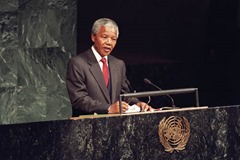Mandela remembered
 agendaNi considers the local links of South Africa’s statesman.
agendaNi considers the local links of South Africa’s statesman.
The global coverage of Nelson Mandela’s passing is a testament to his achievements over his 95 years of life. Very few other historical figures can be credited with having such a deep personal and positive influence on the fortunes of their nation.
His tribal forename, Rolihlahla, envisaged a trouble-maker. He was given the name Nelson while at school and his academic gifting took him to the University of the Witwatersrand, where his political interest was sparked.
The 1961 Sharpeville massacre led to Mandela founding the ANC’s armed wing (Umkhonto we Sizwe) and for this he was imprisoned in 1964.
Mandela’s trial gained international attention but he was, for a considerable time, forgotten by most outside South Africa. Media coverage has tended to focus on his liberal supporters who made him a celebrity cause in the late 1980s. Sinn Féin’s links with the ANC, though, date back to the mid-1970s when the party started to identify with ‘peoples in struggle’ around the world.
Gerry Adams was among the first who advocated this approach. The IRA provided some practical support to Umkhonto, helping to plan the attack on the Sasol oil refinery in 1980.
Apartheid attracted wider international attention – and opposition – through the work of Desmond Tutu and white liberals such as Trevor Huddleston and Helen Suzman. By the 1980s, sanctions and growing internal unrest were forcing the regime to change course but much of South Africa’s future depended on what Mandela would say when the prison doors would open.
He fittingly repeated his words from the dock: “I have fought against white domination and I have fought against black domination. I have cherished the ideal of a democratic and free society in which all persons live together in harmony and with equal opportunities. It is an ideal which I hope to live for and to achieve. But if needs be, it is an ideal for which I am prepared to die.”
It is remarkable that only four years later, he took office as President alongside FW de Klerk as his deputy. The Rainbow Nation is still thankful that civil war was averted.
Unionists were generally sceptical of Mandela, having associated him with republicanism, but the relationship warmed after a cross-party delegation from Northern Ireland met him in 1997. Mandela was careful not to draw comparisons and instead encouraged the parties to take responsibility for their own settlement.
His legacy is, first and foremost, for South Africa. Many of his fellow citizens will hope that Mandela’s memory will inspire today’s leaders to overcome the country’s current struggles against crime, unemployment and HIV. To the wider world, he set an example of one who moved from violence to peace and used the power of dignity, grace and forgiveness to great effect.
Photo Credit: UN Photo/Eskinder Debebe





